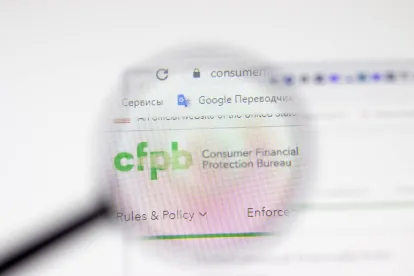On April 3, the Consumer Financial Protection Bureau (CFPB) published its Policy Statement on Abusive Acts or Practices (Policy Statement or Statement). Notably, in connection with the Policy Statement's issuance, the CFPB stated in its accompanying release (Release) that it would accept comments after publication of the Statement, although the agency release did not contain any limiting language with respect to its seemingly immediate effectiveness. As such, without further clarification from the CFPB, the agency's assessment of the interpretive framework for what constitutes an "abusive" act or practice is effective and must be an integral component of a consumer product provider's policies and procedures.
In describing the need for the issuance of the Policy Statement, the Release notes that the CFPB has, to date, brought 43 enforcement actions that have included a claim by the agency that a provider engaged in "abusive" acts in connection with some component of the offered product or serviced (such as marketing, originating or servicing). Title X of the Dodd-Frank Act adopted a statutory definition of "abusive"1 and prohibits statutorily defined "covered persons" and "service providers"2 from engaging in "abusive" acts or practices with respect to financial products delivered to US consumers (and includes a simultaneous prohibition against acts and practices that are unfair or deceptive). Yet, the Policy Statement defines "abusive" as follows:
An abusive act or practice (1) materially interferes with the ability of a consumer to understand a term or condition of a consumer financial product or service; or (2) takes unreasonable advantage of:
- A lack of understanding on the part of the consumer of the material risks, costs or conditions of the product or service;
- The inability of the consumer to protect the interests of the consumer in selecting or using a consumer financial product or service; or
- The reasonable reliance by the consumer on a covered person to act in the interests of the consumer....
[A]busive conduct generally includes (1) obscuring important features of a product or service or (2) leveraging certain circumstances — including gaps in understanding, unequal bargaining power, or consumer reliance — to take unreasonable advantage.
Standard-Form Consumer Agreements
In connection with such abusive conduct, the Policy Statement describes one component of potential "material interference" with respect to a consumer's understanding of a product's terms or conditions with an eye toward standard form consumer disclosures. It provides, in relevant part, as follows:
Certain terms of a transaction are so consequential that when they are not conveyed to people prominently or clearly, it may be reasonable to presume that the entity engaged in acts or omissions that materially interfere with consumers' ability to understand. That information includes but is not limited to, pricing or costs, limitations on the person's ability to use or benefit from the product or service, and contractually specified consequences of default.
Additionally, an entity's provision of a product or service may interfere with consumers' ability to understand if the product or service is so complicated that material information about it cannot be sufficiently explained or if the entity's business model functions in a manner that is inconsistent with its product's or service's apparent terms. (Emphasis added).
Notably, in a lawsuit announced by the CFPB in July, this nexus between standard form disclosures and consumers' understanding of the product's terms and conditions formed the basis for an action against a provider of consumer income share agreements (Income Share Lawsuit). Specifically, with respect to the Income Share Lawsuit, the CFPB (along with 11 other state regulators) alleged that affected consumers "were unaware that [the Defendant] could file an action in Delaware because [the Defendant's] income share loans did not provide for venue in Delaware or the consumers had little or no opportunity to review or negotiate that provision" (emphasis added).
What This Means for Providers
Although certain federal consumer protection laws currently contain prescriptive disclosure obligations such as the Truth in Lending Act3 and the Consumer Leasing Act,4 providers of consumer financial products and services should view these CFPB announcements as an invitation to review their consumer-facing disclosures to ensure that the terms are clear, easy to understand and prominently displayed. Potential efforts to ensure compliance include the following: (a) readability assessments by third-party providers to determine the complexity of written disclosures;
(b) prominence of fees and charges through bold print or unified placement (through a textual box or otherwise); and (c) internal assessments of consumer complaints to determine where alleged "disconnects" between the written disclosures and consumer understanding have been identified.
While these assessments may be burdensome on lenders that are strained by increasing consumer defaults and a myriad of state and federal compliance obligations, fulsome assessments of issues related to consumer-facing disclosures will likely yield important benefits for providers both in terms of regulatory "friction" and potential exposure to private party litigation.
1 1 12 USC § 5531(d).
2 2 12 USC § 5536(a)(1)(B).
3 3 15 USC §§ 1601 et seq.
4 4 15 USC §§ 1667 et seq.





 />i
/>i

